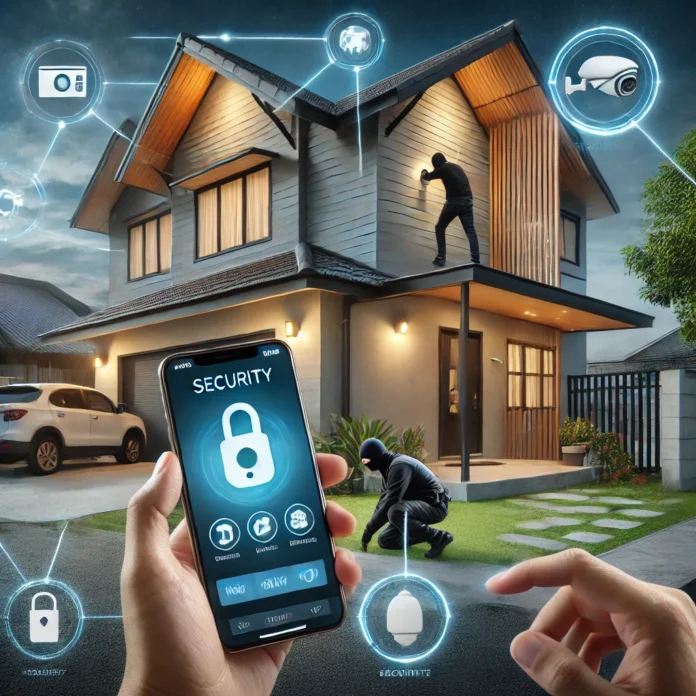The world we live in today requires homeowners to prioritize home security systems. A Security System is more than an investment when there are increasing self-threats such as burglaries, fire hazards, and cyber intrusion. This article will examine the security system as a risk management strategy focusing on its benefits, types, and impacts on safety.
Risk Management Preparing Security Measures for the Home
Home risk management is the process of mitigating risk by protecting specified assets and people. In the case of home security, risk management involves means of action that prevent or respond to any adverse threats in and around the premises. There is a good chance that a security system will deter criminal activity and even if a crime does take place, the security system will ensure that the damage is contained and properly diminished.
Classification of Home Security Systems
Monitored Security Systems
- These types of systems can be integrated into a professional monitoring service.
- These systems not only alert the user but also send a notification to emergency responders.
Unmonitored Security Systems
- Alarms that are not linked to emergency services but instead notify around local homes.
- Homeowners have to depend on notifications from local sirens.
Wired versus Wireless Security Systems
- Wired: Physical connections are a requirement, which makes them more difficult to install but rely heavily on the system.
- Wireless: It utilizes Wi-Fi or mobile connectivity therefore is flexible but can easily be a target for cyber threats.
Smart Security Systems
- It is integrated with IoT devices including smart locks, cameras, or other sensors.
- It facilitates remote access and surveillance through the use of smartphones.
Surveillance Cameras
- It records and stores footage that can be reviewed at a later time.
- It also serves to dissuade crime.
How Security Systems Help in Risk Management
Crime prevention and Deterrence
The presence of the alarm system itself may dissuade criminals from breaking into your house. Various studies show that such systems dramatically reduce the incidence of break-ins.
Immediate Threat Detection and Response
Sophisticated systems now detect unauthorized entry, fire, gas, and water flooding and immediately alert the concerned parties.
Reducing Financial Losses
Burglary and home intrusions can centrally impact the finances of an individual. These systems are designed to avoid such incidents thereby reducing any expenditure that would have otherwise gone towards damages, repairs, replacements, or even claims on insurance.
Lower Home Insurance Premiums
Those covered by insurance scavenger systems also enjoy lower premiums. Many insurance companies tend to offer discounts for homes secured with burglar systems. This stands as further cost reimbursement for investing in a proactive risk management procedure.
Enhancing Personal and Family Safety
The security of loved ones has always been the foremost reason for obtaining these systems. Emergency buttons, in conjunction with fire alarms, provide instant aid when required.
Information Safeguarding from Cyber Risks
As the development of smart home devices burgeons, cybersecurity now features prominently in risk management. A well-protected network ensures access to private information remains restricted.
Comparing Risk Levels: Homes With vs. Without Security Systems
| Feature | Homes With Security Systems | Homes Without Security Systems |
| Crime Vulnerability | Low | High |
| Emergency Response | Immediate | Delayed |
| Financial Risk | Lower | Higher |
| Insurance Premiums | Reduced | Standard/High |
| Safety Assurance | High | Low |
Selecting An Appropriate Security System
Evaluate Risk Factors for the Particular Home:
Analyze the crime rates in your locality, the size of the property, and weak spots that can be easily accessed.
Consider the Amount of Money you’re Willing to Spend
Security systems can be advanced or basic. Your budget and security requirements should dictate which concepts or systems are chosen.
Check Compatibility with Smart Home Systems
A system that supports smart home features offers more convenience and control.
Traditional Professional Installation or Self Installation
- Professional Installation: Guarantees great setup, however, can be very expensive.
- Self Installation: Cheaper, but it is not easy if you lack the technical know-how.
Customer Satisfaction and Serviceability
Use socially trusted brands that usually have great reviews and offer good customer service.
The Importance of Security Systems During Emergencies
Fire/Gas Breakage
Smart sensors for smoke and gas leakages would have alarms enabled to alert the homeowner and immediate notification activated.
Medical Emergency Alerts
Some security systems provide panic buttons that can get in touch with emergency services during a health crisis.
Monitoring 24/7
Professional security services provide complete peace of mind by monitoring day and night.
FAQs
How does a security system prevent crime from occurring?
By improving the chances of detection and capture, security systems lower the appeal of residential premises to criminals.
Can home security systems increase the level of protection and reduce the cost of insurance in a particular premise?
Yes, most home insurance providers using a securitized system of underwriting will reduce premiums on homes that have security systems.
What are the most basic elements of a home security system?
Comprehensive systems have essential features like security cameras, intrusion detectors, smoke detectors, mobile applications for control, and IoT capability.
Are wireless security systems effective?
Yes, but a reliable internet connection is needed. Some systems are designed with battery power sources to mitigate disruptions.
How often should one renew their security system and or upgrade the parts?
Every 2-3 years for optimal functionality and security reasons it is necessary to update components as well as perform regular maintenance.
Conclusion
Grasping how the presence of a security system at home is a form of risk management aids homeowners in making sound safety decisions. The right choice of a security system encompasses much more than crime prevention; it includes immediate alerts, cost savings, and improved personal safety. A well-chosen security system guarantees protection for you and your family for many years, giving you peace of mind.


